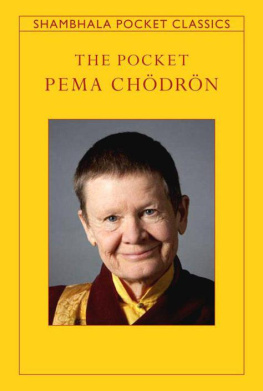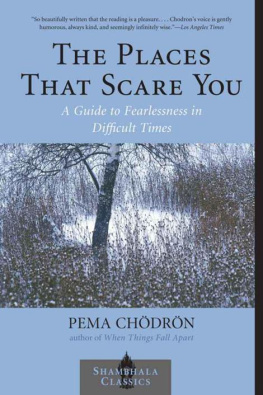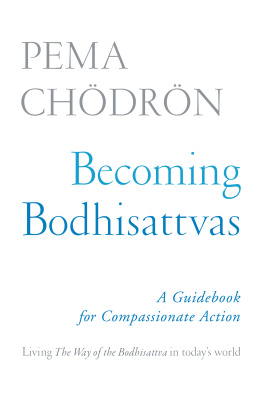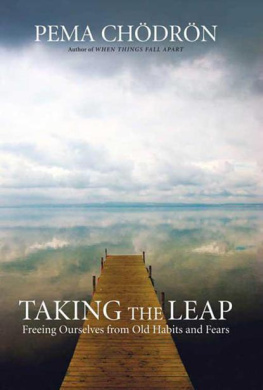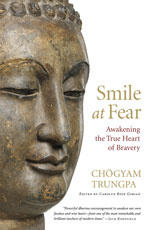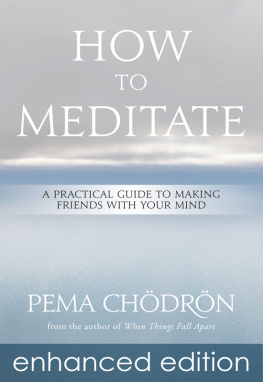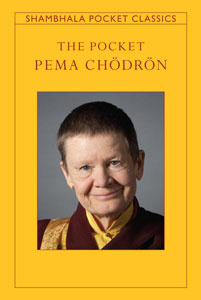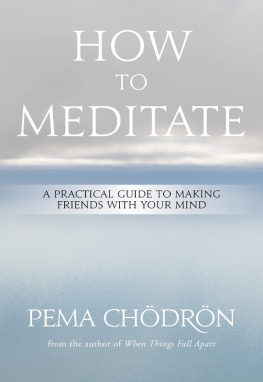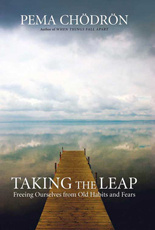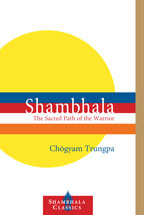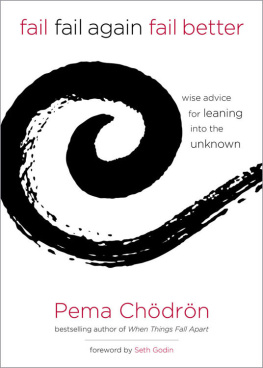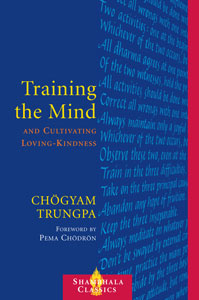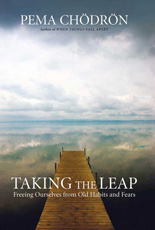THE POCKET PEMA CHDRN
Edited by
EDEN STEINBERG

SHAMBHALA
Boston & London
2010
Shambhala Publications, Inc.
Horticultural Hall
300 Massachusetts Avenue
Boston, Massachusetts 02115
www.shambhala.com
2008 by Pema Chdrn
See Sources section for further copyright information.
All rights reserved. No part of this book may be reproduced in any form or by any means, electronic or mechanical, including photocopying, recording, or by any information storage and retrieval system, without permission in writing from the publisher.
L IBRARY OF C ONGRESS C ATALOGING-IN- P UBLICATION D ATA
Chdrn, Pema.
The pocket Pema Chdrn.1st ed.
p. cm.
eISBN 978-0-8348-2117-0
ISBN 978-1-59030-651-2
1. Religious lifeBuddhism. I. Title.
BQ5405.C46 2008
294.3444dc22
2008017612
CONTENTS
EDITORS PREFACE
This collection brings together some of the most memorable, pithy, and potent teachings of Pema Chdrn, the beloved American Buddhist nun and best-selling author. Drawn from her previously published works, these teachings offer us a bold vision of meeting each moment of our lives with greater wisdom, courage, and compassion.
Pema Chdrn has a stunning gift for expressing the Buddhist teachings in straightforward terms that resonate with peoples lived experiencea gift born of more than three decades of committed study and practice of Tibetan Buddhism.
Many of her readers may not know that she was born Deirdre Blomfield-Brown in New York and began studying Tibetan Buddhism in 1972. She was ordained as a nun in 1974, at the age of thirty-eight. For thirteen years she studied with the renowned Tibetan meditation master Chgyam Trungpa, up until his death in 1987. Today she continues to study and practice intensively, refining and deepening her understanding of the Buddhist teachings.
Pema Chdrns writing reaches beyond religious and sectarian boundaries to speak to readers of many faiths and backgrounds. Her popularity as a teacher seems linked to the fact that she does not present herself as an enlightened being but as an ordinary person, writing openly about her own limitations and struggles. Like us, she also gets angry, jealous, and depressedand precisely because of this shes able to offer guidance that hits home.
I hope you will enjoy these insightful and inspiring selections. In these uncertain times, the teachings presented here can help us to awaken to the fearlessness and clear-seeing that is, as Ani Pema reminds us, our fundamental nature and our greatest resource.
E DEN S TEINBERG
Cambridge, Massachusetts
The noble heart
B ODHICHITTA is a Sanskrit word that means noble or awakened heart. It is said to be present in all beings. Just as butter is inherent in milk and oil is inherent in a sesame seed, this soft spot is inherent in you and me.
It is said that in difficult times, it is only bodhichitta that heals. When inspiration has become hidden, when we feel ready to give up, this is the time when healing can be found in the tenderness of pain itself. This is the time to touch the genuine heart of bodhichitta. In the midst of loneliness, in the midst of fear, in the middle of feeling misunderstood and rejected is the heartbeat of all things, the genuine heart of sadness.
Just as a jewel that has been buried in the earth for a million years is not discolored or harmed, in the same way this noble heart is not affected by all of our kicking and screaming. The jewel can be brought out into the light at any time, and it will glow as brilliantly as if nothing had ever happened. No matter how committed we are to unkindness, selfishness, or greed, the genuine heart of bodhichitta cannot be lost. It is here in all that lives, never marred and completely whole.
We already have everything
W E already have everything we need. There is no need for self-improvement. All these trips that we lay on ourselvesthe heavy-duty fearing that were bad and hoping that were good, the identities that we so dearly cling to, the rage, the jealousy and the addictions of all kindsnever touch our basic wealth. They are like clouds that temporarily block the sun. But all the time our warmth and brilliance are right here. This is who we really are. We are one blink of an eye away from being fully awake.
Looking at ourselves this way is very different from our usual habit. From this perspective we dont need to change: you can feel as wretched as you like, and youre still a good candidate for enlightenment. You can feel like the worlds most hopeless basket case, but that feeling is your wealth, not something to be thrown out or improved upon.
The path of the bodhisattva-warrior
W HEREVER we are, we can train as a warrior. The practices of meditation, loving-kindness, compassion, joy, and equanimity are our tools. With the help of these practices, we can uncover the soft spot of bodhichitta, the tenderness of the awakened heart. We will find that tenderness in sorrow and in gratitude. We will find it behind the hardness of rage and in the shakiness of fear. It is available in loneliness as well as in kindness.
Many of us prefer practices that will not cause discomfort, yet at the same time we want to be healed. But bodhichitta training doesnt work that way. A warrior accepts that we can never know what will happen to us next. We can try to control the uncontrollable by looking for security and predictability, always hoping to be comfortable and safe. But the truth is that we can never avoid uncertainty. This not knowing is part of the adventure, and its also what makes us afraid.
Bodhichitta training offers no promise of happy endings. Rather, this I who wants to find securitywho wants something to hold on tocan finally learn to grow up. The central question of a warriors training is not how we avoid uncertainty and fear but how we relate to discomfort. How do we practice with difficulty, with our emotions, with the unpredictable encounters of an ordinary day?
Right here is a good place to start
S TART where you are. This is very important. Meditation practice is not about later, when you get it all together and youre this person you really respect. You may be the most violent person in the worldthats a fine place to start. Thats a very rich place to startjuicy, smelly. You might be the most depressed person in the world, the most addicted person in the world, the most jealous person in the world. You might think that there are no others on the planet who hate themselves as much as you do. All of that is a good place to start. Just where you arethats the place to start.
Life is a good teacher
L IFE is a good teacher and a good friend. Things are always in transition, if we could only realize it. Nothing ever sums itself up in the way that we like to dream about. The off-center, in-between state is an ideal situation, a situation in which we dont get caught and we can open our hearts and minds beyond limit. Its a very tender, nonaggressive, open-ended state of affairs.
Why meditate?
W HY do we meditate? This is a question wed be wise to ask. Why would we even bother to spend time alone with ourselves?
First of all, it is helpful to understand that meditation is not just about feeling good. To think that this is why we meditate is to set ourselves up for failure. Well assume we are doing it wrong almost every time we sit down: even the most settled meditator experiences psychological and physical pain. Meditation takes us just as we are, with our confusion and our sanity. This complete acceptance of ourselves as we are is called maitri , or unconditional friendliness, a simple, direct relationship with the way we are.
Find out for yourself
Next page
